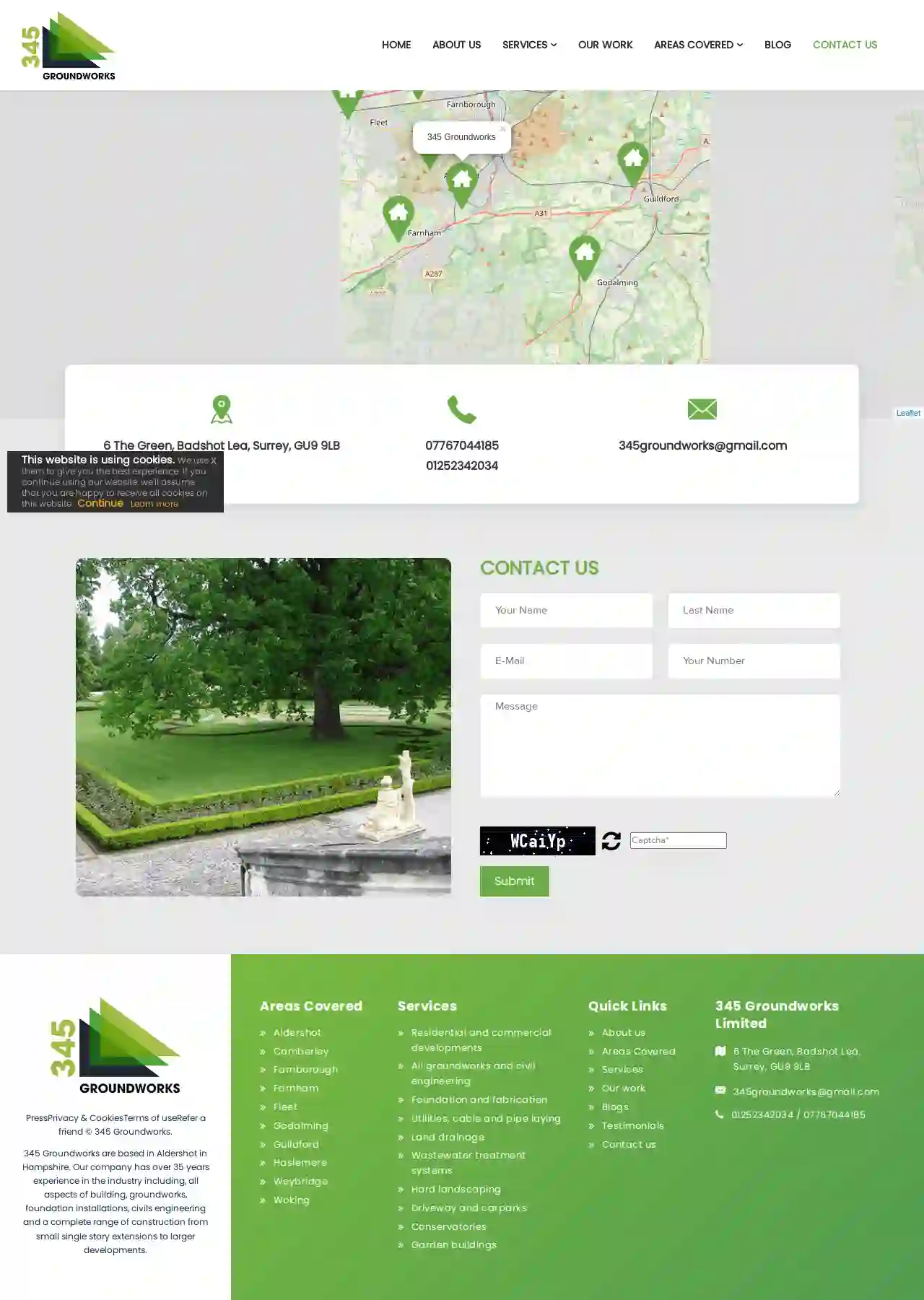Excavation Contractors Aldershot
Find Excavating Contractor in Aldershot
Get up to 3 Land Excavation quotes for your project today! Compare profiles, reviews, accreditations, portfolio, etc... and choose the best service.

Globic Groundworks
1Camp Sewage Disposal Works, Camp Farm Road, Aldershot, GU11 2NS, GBWelcome to Globic Groundworks Globic Groundworks has been providing a comprehensive range of groundworks services for the past 50 years. From all types of roadworks, including driveway repair and resurfacing, to excavation, and drain and sewer unblocking, cleaning and repair, Globic Groundworks possesses the experience, equipment, and expertise to tackle any project, regardless of size. We cater to a diverse clientele, including local authorities, housing associations, schools, hospitals, commercial businesses, and private homeowners. Our unwavering commitment is to deliver high-quality services that meet the highest standards, exceeding our clients' expectations. For a tailored solution that precisely aligns with your specific requirements, contact our Aldershot office toll-free at 01252 310515.
- Services
- Why Us?
- Accreditations
- Testimonials
- Gallery
Get Quote- Dr
Drain & Sewer Services
4.515 reviewsAldershot, GB- Services
- Why Us?
Get Quote 
345 Groundworks
51 reviews6 The Green, Badshot Lea, Surrey, GU9 9LB, GB345 Groundworks: Your Trusted Partner for Groundworks and Construction 345 Groundworks is a family-run company with over 35 years of experience in the construction industry. We specialize in providing high-quality groundworks and construction services for both commercial and residential clients in the South East of England. We are committed to delivering exceptional results, exceeding expectations, and building lasting relationships with our clients. Our team of skilled professionals is dedicated to providing a comprehensive range of services, including: Ground Investigations and Groundworks Foundation Installations Civil Engineering Construction Landscaping We understand that every project is unique, and we take a personalized approach to ensure that your needs are met. We are committed to clear communication, keeping you informed every step of the way. We are proud of our reputation for reliability, adaptability, and problem-solving skills, all while maintaining a strong commitment to environmental responsibility. Whether you're planning a small-scale project like a driveway or a large-scale development, we have the expertise and resources to deliver exceptional results. Contact us today to discuss your project and learn how we can help you achieve your goals.
- Services
- Why Us?
- Gallery
Get Quote- FM
FM Conway - Aldershot Asphalt Plant (Conway Collect)
3.918 reviewsAldershot, GB- Services
- Why Us?
Get Quote - Ne
Neil Foundations Systems Ltd (NFS Piling Contractors)
519 reviewsAldershot, GB- Services
- Why Us?
Get Quote - MP
MPE Brickwork & Construction LTD
56 reviewsAldershot, GB- Services
- Why Us?
Get Quote - Fr
Frensham Landscaping
4.85 reviewsAldershot, GB- Services
- Why Us?
Get Quote - An
Andrew Holloway Mini Diggers and Drivers
1Aldershot, GB- Services
- Why Us?
Get Quote - Tr
Tracts Vehicle Repairs Ltd
4.788 reviewsAldershot, GB- Services
- Why Us?
Get Quote
Over 11,537+ Excavation Companies on our directory
Our excavation providers operate in Aldershot and surrounding areas!
ExcavationHQ has curated and vetted Top Excavation Contractors near Aldershot. Find a top & trustworthy business today.
Frequently Asked Questions About Excavation Contractors
- Project Size and Scope: Larger, more complex excavations naturally take longer.
- Soil Conditions: Rocky or challenging soil types can slow down progress.
- Site Accessibility: Limited access might require more time for maneuvering equipment and hauling materials.
- Weather: Inclement weather can cause delays.
- Permitting and Inspections: Waiting for permits or inspections can extend the timeline.
- Clearly Define the Scope: Outline the project's goals, including the excavation area, depth, grade, and intended use.
- Obtain Necessary Permits: Research and acquire any required permits from your local authorities.
- Mark Utility Lines: Contact your utility companies to locate and mark underground utilities to prevent damage.
- Communicate with Neighbors: Inform your neighbors about the project's timeline and potential noise or disruptions.
- Prepare the Site: Clear any obstacles, such as vegetation, furniture, or structures, from the excavation area.
- Discuss Safety Protocols: Review safety procedures with the contractor to ensure a safe work environment.
How long does an excavation project take?
What is the difference between cut and fill excavation?
Cut: Involves excavating soil from an area where the existing grade is higher than the desired grade.
Fill: Refers to using the excavated soil ('cut' material) to raise the grade in an area where the existing grade is lower than desired.
This method minimizes the need to import or export soil, reducing costs and environmental impact. It's commonly used for site preparation, road construction, and landscaping.
What should I do before excavation starts?
What is the difference between topsoil and subsoil?
Topsoil: The uppermost layer, typically rich in organic matter, nutrients, and microorganisms. It's essential for plant growth and is often darker in color.
Subsoil: The layer beneath the topsoil, containing less organic matter and generally denser. It provides support for roots but is less fertile than topsoil.
During excavation, topsoil is often removed and preserved separately for later use in landscaping, while subsoil is typically used for backfilling or other less demanding applications.
How long does an excavation project take?
- Project Size and Scope: Larger, more complex excavations naturally take longer.
- Soil Conditions: Rocky or challenging soil types can slow down progress.
- Site Accessibility: Limited access might require more time for maneuvering equipment and hauling materials.
- Weather: Inclement weather can cause delays.
- Permitting and Inspections: Waiting for permits or inspections can extend the timeline.
What is the difference between cut and fill excavation?
Cut: Involves excavating soil from an area where the existing grade is higher than the desired grade.
Fill: Refers to using the excavated soil ('cut' material) to raise the grade in an area where the existing grade is lower than desired.
This method minimizes the need to import or export soil, reducing costs and environmental impact. It's commonly used for site preparation, road construction, and landscaping.
What should I do before excavation starts?
- Clearly Define the Scope: Outline the project's goals, including the excavation area, depth, grade, and intended use.
- Obtain Necessary Permits: Research and acquire any required permits from your local authorities.
- Mark Utility Lines: Contact your utility companies to locate and mark underground utilities to prevent damage.
- Communicate with Neighbors: Inform your neighbors about the project's timeline and potential noise or disruptions.
- Prepare the Site: Clear any obstacles, such as vegetation, furniture, or structures, from the excavation area.
- Discuss Safety Protocols: Review safety procedures with the contractor to ensure a safe work environment.
What is the difference between topsoil and subsoil?
Topsoil: The uppermost layer, typically rich in organic matter, nutrients, and microorganisms. It's essential for plant growth and is often darker in color.
Subsoil: The layer beneath the topsoil, containing less organic matter and generally denser. It provides support for roots but is less fertile than topsoil.
During excavation, topsoil is often removed and preserved separately for later use in landscaping, while subsoil is typically used for backfilling or other less demanding applications.